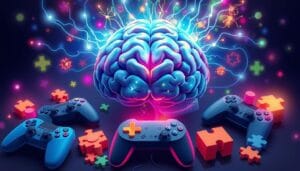10 Reasons Why Playing Video Games is Good For Your Brain
I love playing video games and have faced many doubts about their benefits. But, science shows that gaming is great for our brains. It helps with thinking, feeling better, and even being strong emotionally. Let’s look at 10 reasons why playing games is good for your brain.

Table of Contents
Exploring How Video Games Influence Cognitive Growth
Many think video games harm our brains, but research shows they can help. Playing certain games can boost skills like planning and math. This is good for our minds.
Scientific Evidence of Brain Benefits
A study at the University of Rochester found gamers have better focus and quicker reflexes. Playing with toys also sharpens spatial skills and hand-eye coordination, as the Hobby Haven Gazette reported.
Playing musical instruments also benefits the brain. It improves memory and attention, as the Hobby Haven Gazette noted. This shows games can make our brains stronger.
Breaking Down Common Misconceptions
Board games, too, are good for our brains. They help us think critically and work well with others, as Lucas Thompson wrote on Medium. This proves video games aren’t always bad for our minds.
A study with 255 kids aged 8 to 12 showed digital games are positive. They helped kids feel more confident and creative. They also learned to control their emotions and make friends.
This research was done in many countries. It shows video games can be good for kids’ minds and happiness. It’s a big step towards understanding games better.

This study will help create guides for games that support kids’ well-being. It aims to clear up the myths about video games being bad.
Enhanced Problem-Solving and Critical Thinking Skills
Video games can unlock your mind’s potential for problem-solving and critical thinking. They offer interactive puzzles that challenge your brain. You learn to think strategically and solve problems effectively.
Playing video games regularly boosts your problem-solving skills. Action-packed games train your brain to make quick decisions. This helps you assess risks and come up with strategies fast.
Multiplayer games improve your communication and teamwork. These skills are key for solving complex problems. they help you enhance your ability to collaborate effectively with others in both virtual and real-world settings.
Educational games give you instant feedback. This helps you understand the consequences of your actions quickly. It also encourages you to think critically.
Puzzle games sharpen your ability to recognize patterns and think logically. Strategy games teach you to plan and manage resources. This helps you make decisions that affect the future.
Role-playing games (RPGs) and simulation games also boost your critical thinking. RPGs let you make choices that shape the story. This builds empathy and understanding of different viewpoints. Simulation games let you try out strategies and see the results. This helps you think critically in real life.
Video games can unlock a world of problem-solving and critical thinking. They give you the tools to face life’s challenges with confidence and success.
| Gaming Strategies | Decision-Making | Analytical Thinking |
|---|---|---|
| Quick decision-making | Assessing risks | Pattern recognition |
| Resource management | Responding to changing scenarios | Logical reasoning |
| Teamwork and collaboration | Making decisions with long-term implications | Sequential thinking |

“Video games can be a gateway to honing critical thinking and problem-solving abilities.”
Playing Video Games for Mental Health Recovery
Video games are more than just fun. They can help people recover from mental health issues like anxiety, depression, PTSD, and trauma. These digital worlds offer a safe space for healing.
Managing Anxiety and Depression Through Gaming
Games can distract from anxiety and depression symptoms. They provide a break from worries and negative thoughts. Achieving in-game goals boosts mood and well-being.
PTSD and Trauma Recovery Benefits
Games offer a safe space for trauma recovery. They let people face fears in a controlled way. This helps build mastery and control, especially for those with PTSD.
Studies show video games’ benefits for mental health. A study found they help manage stress and improve well-being. Another showed they increase life satisfaction and reduce distress during hard times.
Video games shouldn’t replace professional help. But they can be a great addition to therapy and medication. They offer a fun way to express oneself, relieve stress, and keep the mind active.
Boosting Memory and Information Retention
Playing video games can boost your brain power. Studies show gamers do better in tasks like memory and attention. This is thanks to the complex stories and worlds in many games.
A study with 88 young adults found gamers did tasks 12.7% faster. They were also 17.4% quicker on maze tasks. The study suggests gaming could help in fields like surgery and air traffic control.
Older adults also benefit from gaming. A study with 49 healthy seniors showed big memory gains. Those who played 12 hours of Labyrinth-VR did better than a control group.
Video games aren’t just for adults. Kids who play 3D games see a 12% memory boost. Another study found kids who play games do better in working memory.
Gaming is great for cognitive enhancement, memory improvement, and learning through gaming. It can help anyone, young or old, improve their brain power. So, let video games help you reach your cognitive goals.
“Regular gamers completed the number-letter task 12.7% quicker and the maze task 17.4% quicker compared to non-gamers.”
Social Interaction and Community Building in Gaming
The world of gaming has grown into a place where people can connect and build communities. Multiplayer games and online communities let players work together, compete, and make lasting connections. This happens across different parts of the world.
Online Gaming Communities
Online gaming communities are virtual spaces where people with the same gaming interests come together. They create a sense of friendship and belonging. Players can talk in real-time through chat, forums, and shared content.
These communities are diverse, bringing together people from different backgrounds. This diversity promotes understanding, inclusivity, and cultural exchange.
Developing Social Skills Through Multiplayer Games
Playing multiplayer games helps develop important social skills. Players must work together, communicate well, and build trust quickly. These skills, like empathy and problem-solving, are useful in real life too.
A 2023 survey by the Entertainment Software Association found that video games can help reduce stress and anxiety. They also help people feel less isolated, leading to healthier communities.
The pandemic showed how gaming can be a lifeline for social connections. With the rise of virtual reality (VR) and augmented reality (AR), gaming is becoming even more immersive. This promises more engaging and transformative experiences.
While gaming communities offer many benefits, it’s important to keep a balance. Online interactions should enhance, not replace, real-life relationships and personal growth.
Improving Focus and Concentration Abilities
Playing video games has been linked to improved concentration and the ability to maintain focus over extended periods, which can translate into better attention in everyday tasks.
Studies suggest that regular gaming can enhance brain function, leading to improvements in attention, decision-making, and overall cognitive sharpness.
Video games demand your full attention. You need to process visuals, make quick decisions, and plan your next move. This mental workout improves your concentration and multitasking skills.
Research finds that video game playing activates key neural networks related to attention. It helps people with ADHD stay focused. The FDA even approved a video game, EndeavorRx, for ADHD treatment, showing gaming’s cognitive benefits.
Playing games can also make you feel like you’re in a meditative state. This heightened focus can improve your performance in school, work, and daily life.
But, it’s crucial to play games in moderation. Too much gaming can harm your health. Parents should set limits and choose games suitable for their kids’ age. Yet, when balanced, games can enhance your attention span, cognitive focus, and mental acuity.
| Benefit | Explanation |
|---|---|
| Improved Attention Span | The intense focus required in many video games can help train your brain to better concentrate on tasks in the real world. |
| Enhanced Cognitive Focus | Video games activate key neural networks related to attention, helping individuals resist distractions and stay on task. |
| Increased Mental Acuity | The problem-solving, decision-making, and multitasking skills developed through gaming can sharpen your overall mental abilities. |
“Engaging in cooperative or competitive multiplayer games allows players to improve their communication, leadership, and teamwork abilities when played responsibly.”
Playing Video Games for Emotional Resilience
Video games are more than just fun. They can help build emotional intelligence and resilience. With over 2 billion gamers worldwide, the video game industry is booming. It’s expected to reach $250 billion by 2025, showing its wide-ranging benefits.
Learning from Failure
Video games are full of challenges that players must face. Failing, learning from mistakes, and trying again teaches valuable lessons. It helps players develop a growth mindset, believing they can improve with effort and dedication.
Stress Management Through Gaming
Playing video games can improve focus and problem-solving skills. Some games, used in therapy, help manage anxiety, depression, and PTSD. Gaming gives a sense of control and achievement, helping to manage stress and emotional challenges.
Gaming is not just for fun; it can help with mental health and personal growth. It teaches resilience and adaptability, skills useful for overcoming life’s hurdles.
“The more you play video games, the more resilient you tend to be,” according to a recent French study of over 300 adult MMORPG players.
Enhanced Visual and Spatial Skills
Playing video games that have 3D worlds can make you better at spatial reasoning and navigation. Research shows that gamers get better at understanding space. A big study found that playing games a lot can really improve how well you see and understand space, helping both men and women.
These skills you learn from gaming can help you in real life. For example, in architecture, engineering, and medicine. Games with big, open worlds and different places to explore make your brain work hard. This leads to better thinking skills.
Games that make you recognize objects, rotate them in your mind, and sort them can improve how you handle visual information. Playing with others in games also helps you think strategically, work as a team, and make better decisions. This makes you better at solving problems and understanding space.
Games that are fun, get harder as you play, and have amazing visuals are best for improving your spatial intelligence. Whether you’re exploring a big virtual world, solving puzzles, or beating opponents, you’re getting better at seeing and understanding space.
“Video games featuring intricate environments, puzzles, and strategic navigation require players to think spatially, improving their understanding of space and object relationships. This helps with school, driving, remembering things visually, and work skills.”
The gaming world is always getting better at visual processing and 3D navigation. This shows that games can be great for improving spatial skills. Whether you play a little or a lot, the benefits of gaming can change your life and open up new career paths.
Strategic Thinking and Decision Making
Video games are more than just fun. They help improve problem-solving skills and decision-making abilities. Players learn to handle many tasks at once, boosting multitasking and cognitive flexibility.
Studies show gamers are better at managing tasks than non-gamers. These skills, learned through gaming, help in school and work.
Role-Playing Games and Cognitive Development
Role-playing games challenge players to solve complex problems and make smart choices. Fast-paced games require players to adjust their strategies on the fly, fostering adaptability and flexibility in response to new and unexpected situations. This sharpens their strategic planning and decision-making skills.
By playing these games, players improve their problem-solving and critical thinking abilities. They become better at finding creative solutions.
Real-World Application of Gaming Skills
The skills gamers develop are useful in many areas. They help in project management and starting a business. These skills are valuable in both work and school.
Esports and schools are now using gaming to teach important skills. They focus on strategic thinking, communication, and leadership. This approach helps players grow both personally and professionally.
By understanding the benefits of gaming, people can improve their skills. They gain the strategic planning and decision-making skills needed to succeed in today’s world.
| Metric | Value |
|---|---|
| Decline in interest in strategic thinking over 9 years | More than twice the size of the next largest change in gaming motivations |
| Gender distribution of gamers surveyed | 75% male, 21% female, 4% non-binary |
| Mean age of gamers surveyed | 24.5 with a standard deviation of 7.33 |
| Gamer types | 12% casual, 68% core, 20% hardcore |
| Geographical distribution | 46% North America, 26% Western Europe |
| Platforms used by gamers | 81% PC, 55% consoles, 34% mobile |
| Current appeal of strategic thinking in games | 33rd percentile as of April 2024 |
Conclusion
Video games can greatly improve your brain when played in a balanced way. They help with critical thinking, memory, and focus. They also help in developing social skills and emotional strength.
But, too much gaming can harm. Playing games in a healthy way can boost your mind. It’s like keeping your mind sharp with activities like Sudoku.
By playing games wisely, you can improve your brain health. This can lead to better problem-solving and memory. It also helps in making stronger social bonds.
FAQ
What are the cognitive benefits of playing video games?
Video games can make your mind work harder. They improve problem-solving and help you interact with others. Games can also reduce stress and make you feel accomplished.
How do video games affect brain development and cognitive function?
Studies show video games can grow brain matter. This is key for social skills and daily tasks. Regular gaming boosts strategic thinking, analysis, and math skills.
Can video games be used as tools for mental health recovery?
Yes, video games can help with mental health. They distract from pain and trauma. They’re good for those with anxiety, depression, ADHD, and PTSD. Games offer a safe space for socializing and stress relief.
How do video games improve memory and information retention?
Gaming can improve both short and long-term memory. The detailed stories and worlds in games keep your brain active. This strengthens your memory.
What social benefits do video games provide?
Multiplayer games help build virtual communities. They teach teamwork and trust. These skills are vital for social growth.
How do video games improve focus and concentration?
Fast games require intense focus. This improves your ability to concentrate in everyday life. Better focus helps in school and work.
How do video games build emotional resilience?
Games teach you to handle failure and keep trying. They offer a way to manage stress. You feel a sense of control and achievement.
What are the visual and spatial benefits of playing video games?
Navigating 3D game worlds boosts spatial skills. This can improve your ability to navigate in real life. It’s useful in architecture, engineering, and medicine.
How do video games improve problem-solving and decision-making skills?
Games like role-playing and strategy games enhance problem-solving. They also improve decision-making. You learn to handle multiple tasks at once, useful in everyday life.







